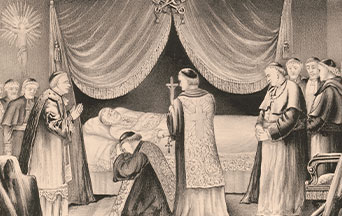
The Entire Catholic World Mourned the Death of Pope Pius IX
The longest papal reign in history up to that time ended when Pope Pius IX died on February 7, 1878. Despite the massive upheavals throughout his reign, the years after the Vatican Council ended in 1870 were, perhaps, the most turbulent.
Liberal politicians in Europe and America resisted the dogma of infallibility. They saw it as a repudiation of the doctrinal foundations of the “Enlightenment” regimes they had successfully established throughout the West. Hard-core revolutionaries were also disillusioned with liberal Catholics who failed to prevent the dogma’s proclamation. Seeing their attempts to cause a schism faltering, these politicians began persecuting the Church to crush Ultramontanism.
After usurping the Papal States, Italy’s government initiated a series of hostile acts against the Holy See. It expropriated convents and persecuted religious orders, which it saw as bulwarks of the papacy.
In Switzerland, Bishop Eugène Lachat of Basel was exiled because he suspended a divinis two priests unwilling to submit to the Vatican Council decrees. In Geneva, priests were forbidden to have any contact with their bishop. Ninety-seven clergymen wrote a joint letter of allegiance to the Holy See. In retaliation, the government imprisoned several of its members. Bishop Gaspard Mermillod was forbidden to exercise any episcopal functions and was expelled from Switzerland in 1873. The Apostolic Nuncio in Lucerne received the bishop’s passport, and Switzerland broke diplomatic relations with the Vatican. The pope protested the Swiss measures against Catholics with the encyclical Etsi multa luctuosa of December 24, 1873.
Eternal and Natural Law: The Foundation of Morals and Law
The Franco-Prussan War, which caused the adjournment of the Vativan council, also saw the establishment of the German Empire under the Prussian (and Lutheran) Kaiser Wilhelm. In Germany, Chancellor Otto von Bismarck inaugurated the Kulturkampf in 1871. He concealed his sectarian hatred under the pretext of defending culture. By Imperial edict, Bismarck closed seminaries, imprisoned bishops, and forbade priests to exercise their ministry without special government authorization. Taking advantage of the prestige the victory against France earned him, the German Chancellor tried to provoke or support the fight against the Church in other countries.
This universal persecution embittered the last years of Pius IX. Nonetheless, the aging pope showed exceptional firmness and unshakable confidence in Providence. Imprisoned in the Vatican, he was at the mercy of the Italian government, which wasted no opportunity to fight him. Animated by indomitable energy, Pius IX reacted against every iniquitous act of the various governments. When Bismarck arrested Bishop Mieczysław Halka-Ledóchowski, Archbishop of Poznań, in 1874, Pius IX immediately elevated the prelate to the cardinalate. The pontiff showed no less prudence and discernment when Spain tried to involve him in liberal politics. The Spanish government tried to choose him as arbiter in the conflict between Carlistas, Alfonsistas and Republicans. Pius IX refused because he thought the Spanish partisans would not abide by his decision.
Sustained by the pope, the pastors and faithful reacted magnificently. Great associations arose everywhere, strengthening the Catholic movement for years to come. In Switzerland, the Pius IX Association or Piusverein, was animated by the famous theologian Auguste Scharderet, founder of the Catholic newspaper La Liberté. In Germany, Bishop Wilhelm von Ketteler of Mainz established the Society of German Catholics. Baron Ludwig Windthorst assumed the leadership of Catholic deputies in the Reichstag by forming the Center Party, which survived until the advent of Nazism in 1933. In short, there was a revival of religion in all countries. The persecution provoked a healthy separation of camps, exposing the enemies of the Church without their usual gimmicks of hypocrisy.
 Learn All About the Prophecies of Our Lady of Good Success About Our Times
Learn All About the Prophecies of Our Lady of Good Success About Our Times
France did not initially follow this religious renaissance because it was trying to get back on its feet after its defeat and humiliation in 1870. But the first post-war election brought a sizable Catholic majority to the Assembly. In l’Univers, Louis Veuillot asked his readers to appeal to French deputies to force Italy to return the Papal States to papal control. Such petitions constantly reached Parliament and created serious embarrassment for the government, which opposed the people’s desire.
The death of Pius IX in 1878 triggered widespread mourning. The entire Catholic world paid him the tributes due to a great pope. Following the Vatican Council, he was recognized as one of the greatest pontiffs in the history of the Church. All countries organized crowded pilgrimages to comfort the Vicar of Christ by showing him that the Catholic movement, sure of final victory, was strong and willing to endure any persecution.
This has been a quick summary of the closing years of Pius IX’s life. His long and eventful reign saw a renaissance of French Catholicism, which 1789 revolutionaries could never have foreseen. In France, Ultramontanism achieved the prominence we sought to describe in this series of articles. However, France was not alone in this revival of Catholic fervor. It also took place in all countries, especially in Europe.’

